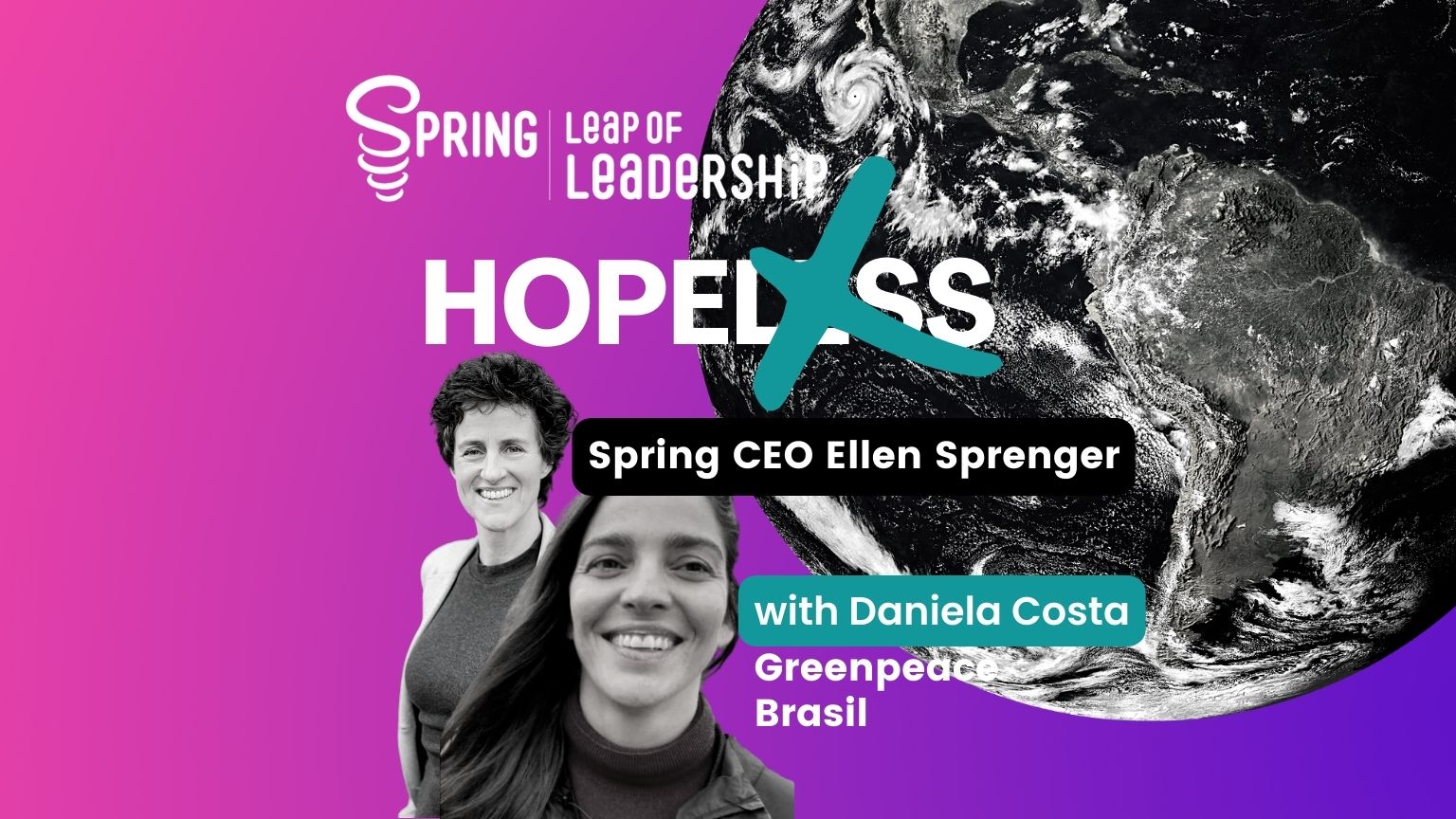Leading with Radical Hope and Honesty in the Climate Crisis

In June 2022, our community of social and climate justice leaders came together to speak frankly about the mixed and challenging emotions of taking action in the midst of a climate emergency.
Climate is a topic that stirs up many emotions: fear for our communities, grief over what we’ve already lost, anxiety about what’s to come, along with the radical hope that it is possible to change our futures. Yet, many among us are burning out. Others veer into hopelessness (or helplessness) and avoidance. In this conversation Spring CEO (and leadership coach!) Ellen Sprenger and guest Daniela Cost of Greenpeace Brasil hold each other differently, talking about what's happening around us all and what to do with the tensions we experience when trying to act on climate.
Listen to the audio summary of the conversation’s highlights
Explore how to bring some of the ideas into your own life and leadership practice.
Takeaway: Hope isn’t what you think
A common thread in Spring’s June 2022 Leap of Leadership conversation was that hope is something far more gentle and gritty than the passive wish it’s often taken to mean. Radical hope is a living thing. It’s the embodiment of the belief that what we do matters. The thinkers from whom Spring’s community draws strength made this apparent.
Indigenous rights activist and spiritual teacher Sherri Mitchell Weh’na Ha’mu Kwasset, for example, has put it like this: “We are the lucky ones.” Our ancestors dreamed us into existence and now we are here, and we can do something about the climate crisis.
Eco-philosopher Joanna Macy, calls it active hope: “waking up to the beauty of life on whose behalf we can act.” It’s a chance to discover occasions for love as well as our own strength, authority, diligence and ability to lead. “None of these can be discovered in an armchair or without risk,” she says.
Author Alexandra Rowland approaches it with a storyteller’s mind: “hopepunk.” Good doesn’t necessarily conquer evil. Perhaps there is no heroes or villains, just humans who can offer one another mercy and shelter during the fight. “That’s hopepunk,” Rowland writes. “Whether the glass is half full or half empty, what matters is that there’s water in that glass. And that’s something worth defending.”
Putting it into practice: Honour yourself and share your gifts
Community is essential for resilience. Build yours from the inside out. What are the values that are driving you? Where can you find people who share those values … and how can you extend grace or mercy to those around you who don’t? Be clear about the “why” of what we do and how we fight, says Daniela. “[We’re] most powerful if driven by our values. It injects positivity into an already stressful time.” What can you contribute without depleting or betraying yourself or sacrificing the relationships you treasure?
Daniela talked at our meetup about the disappointment of attending intergovernmental climate negotiations and witnessing failures first hand. Finding space to be alone, to be quiet, to grieve, but to come back and connect with fellow activists, was how she stayed resilient.
We all bring different strengths and energies to the table. Yours might be giving someone else exactly what they need—a historical perspective to see progress made that once seemed impossible to get you through the next round of negotiations; a kindled bit of rage to fuel you through the next protest; or, simply the permission to grieve. As Daniela notes, “Some days we will be more hopeful than others.” Let your heart break. Honesty in the age of the anthropocene means being soft enough to be vulnerable and strong enough to arrange the pieces of our heart back together to live, love and fight another day.
Putting it into practice: Living differently, not lifestyle activism
Mainstream climate discussions often focus on what to stop doing, especially when it comes to lifestyle activism. But focusing only on consumption, what we wear or buy, is a distraction, a continued focus on a way of consuming nature that puts the needs of humanity at the top of a hierarchy.
Indigenous Brazilian scholar Ailton Krenak encourages us to break free of the notion of humanity’s supremacy and instead to start seeing the ways in which we are an intrinsic part of the living organism called Earth. We need new ways of dreaming that allow us to reclaim our place among nature, Krenak says. In doing so, we regain joy and the meaning of life.
What do you gain when you begin to see the ways in which you are part of nature, that you are a steward of the land that in turn sustains you? What changes when you think of yourself in terms of your ancestral relationships, past and future? How can your actions shift as a result of these relationships? By thinking and living — being — differently, we can begin to change the world. Learning from Indigenous cosmologies that have long predicted the current crisis, is essential. Surviving as we know it needs to give way, surrendering to ways of living that have yet to be imagined … or perhaps have been nearly erased until now.
Recommended Resources
-
Sacred Instructions: Indigenous Wisdom for Living Spirit-Based Change. By Sherri Mitchell.
-
Ideas to Postpone the End of the World. By Ailton Krenak.
Leap of Leadership is Spring’s monthly online meetup for social justice changemakers around the world. Each month, we tackle cutting-edge topics through new tools, concrete practices and exchanges with peers. Learn more or sign up to join our monthly drop-in sessions and receive our monthly emails.
Tags:
Leap of LeadershipAugust 30, 2022

